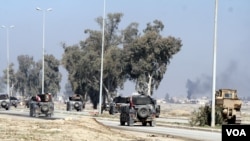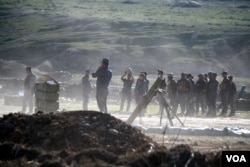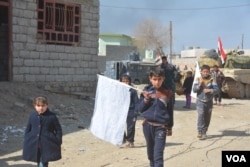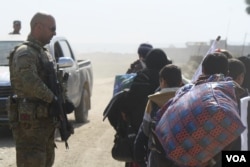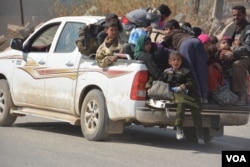"If you trap a cat in a closet, he will fight like hell to get out," says Ahmed Ghalibi as multiple car bombings send smoke billowing over a nearby Iraqi neighborhood.
Standing Sunday on a rooftop with a view of the week-old fight for western Mosul, Ghalibi, a soldier with Iraq's Emergency Response Unit — one of the branches of the Iraqi armed forces leading the charge into Islamic State-controlled territories — says he has witnessed the battle for Mosul change abruptly.
In the fight for eastern Mosul, suicide bombers, sniper fire and mortars generally attacked Iraqi forces as IS militants fell back. Now, militants have nowhere left to flee and their defense lines are fiercer than ever.
Civilian cars have been co-opted and laced with bombs, making it impossible to distinguish suicide bombers from families, and IS's best weaponry and fighters are now on the front lines.
East of the Tigris River, locals say experienced fighters often fled ahead of Iraqi and coalition forces' advances, leaving the youngest and least-equipped alone in battle. Most militants blew themselves up, were killed by Iraqi forces, or fled.
Now, IS has moved experienced and foreign fighters to the front as Iraqi forces slowly advance through a relentless assault. Snipers, planted explosives and mortars kill and maim people in the surrounding area.
"Mortars can go three kilometers," says Ghalibi. "It's the chicken way."
Families flee, remain
A few blocks away, Ghalibi greets families as they trudge out of battle zones carrying white flags tied to sticks, a symbol they hope will encourage all sides to hold their fire.
"You are liberated; you don't need this anymore," he says, taking the flag from a harried-looking young husband and tossing it into the dust.
The cries of a baby whimpering in his wife's arms grow louder. "My son is hungry," the mother says, also crying. "It's been days since I've fed him."
Ghalibi directs the small family in the other direction toward a quiet mosque, an informal pick-up spot where soldiers meet fleeing families. Exhausted and hungry, the families pile into soldiers' pickup trucks, which head toward rapidly erected camps awaiting what could be hundreds of thousands of refugees in the coming months.
Other families remain in their homes, hoping the suffering of the past two-and-a-half years will soon end.
As the small family made its way down a dusty street on Sunday, two days after Iraqi forces captured this Mosul suburb, Mohammad Jasim, a taxi driver, says he, his wife and four children are taking their chances at staying.
Prices, however, ballooned under IS and haven't immediately dropped, he says. There is no guarantee they won't eventually be forced to abandon their home to find food.
For example, sugar is now 25 to 35 times its normal price, he says, and in the last weeks of IS rule, militants damaged people's homes as they prepared to take their final stand in the neighborhood.
"They made people break through the walls between peoples' gardens so they could move from house to house unseen," Jasim says. "And they demanded access to rooftops to position their snipers. Who would dare to say no?"
Children and pets
Children of the families remaining on this block wander in the streets. Some comment that they are hungry and have not eaten anything that day, but express little anguish over the matter.
Questions about IS rule, however, spark raised voices and angst among the children, who are quick to rail against the indignities of schools that teach "one bullet plus one bullet equals two bullets" and streets too dangerous to play in.
Mustafa, 12, complains that pet pigeons were forbidden under IS, as well as nearly everything else that was once fun. Worst of all, he says, was the wholesale murder of pet dogs when IS moved in.
He said his dogs, Toffee and Rocky, were both shot with a pistol by IS militants. Mustafa eventually buried them in a nearby garden. The house was later hit by an airstrike, collapsing over his dogs' graves.
"They killed all the dogs because they said it was sinful," says Mustafa. "Inside our hearts, we said, 'Dogs are more loyal to people than you.'"
Militants prepare for losing battle
Back on the rooftop, Captain Khalid Mustafa joins Ghalibi in observing the nearby battle. He is with the Iraqi Federal Police, another of Iraq's armed forces which fights on the front lines as well as holding recently recaptured areas.
IS's aggressive defense takes into account the probability that the group will ultimately lose the fight for Mosul, says Mustafa.
While exceedingly well armed and often well trained, IS fighters are estimated to be in the thousands in Mosul. Iraqi and coalition forces number as many as 100,000.
Coalition forces deploy airstrikes, and Iraqi helicopters swirl above the fight, firing machine guns and rockets; however, the assault remains limited as IS militants have as many as 750,000 civilians trapped in their areas.
Future sleeper cells
Foreign fighters often man the front lines, in part to give IS the best chance at winning, says Mustafa. Men who traveled from around the world to join IS tend to be well trained and the most extreme in their beliefs. They are in the Middle East to win — or die trying.
"They put the foreigners in the front so they can have spies later on," says Mustafa. Any remaining foreign fighters will be easily identifiable and quickly arrested, he says.
"Iraqis can just shave their beards and become sleeper cells,'" adds Ghalibi.
As they continue to watch the near-constant explosions in both IS- and Iraqi-held areas on the rooftop, machine gunfire can be heard in the distance; the building has been out of sniper fire range since morning.
Just then, the whirl of a passing sniper bullet is heard, rendering the spot no longer appropriate for a quiet interview. "OK, let's go," says Mustafa, herding soldiers and journalists indoors.




